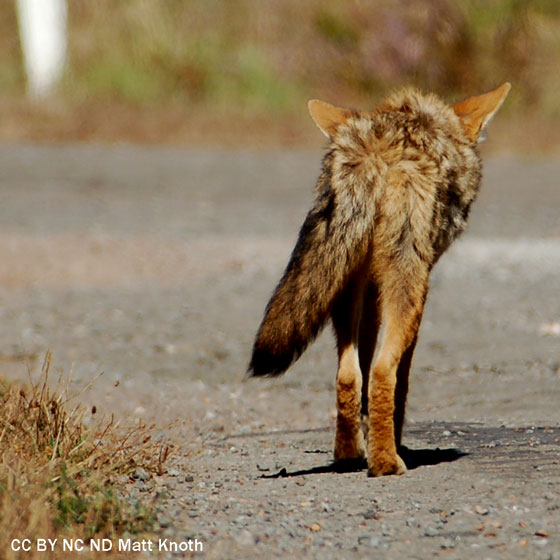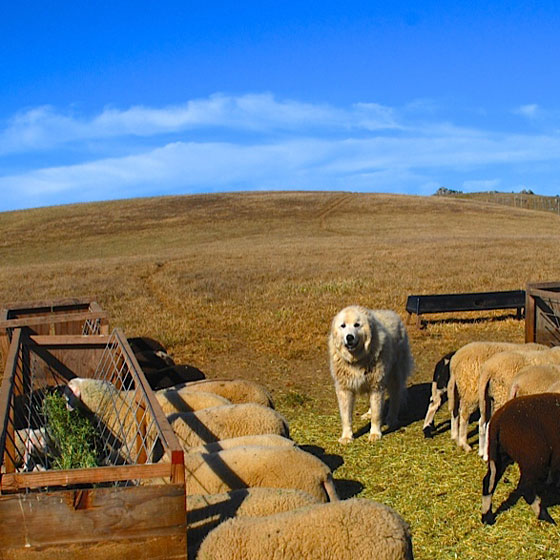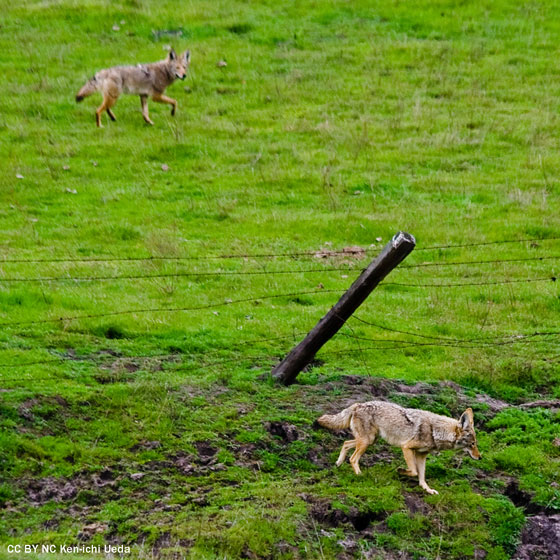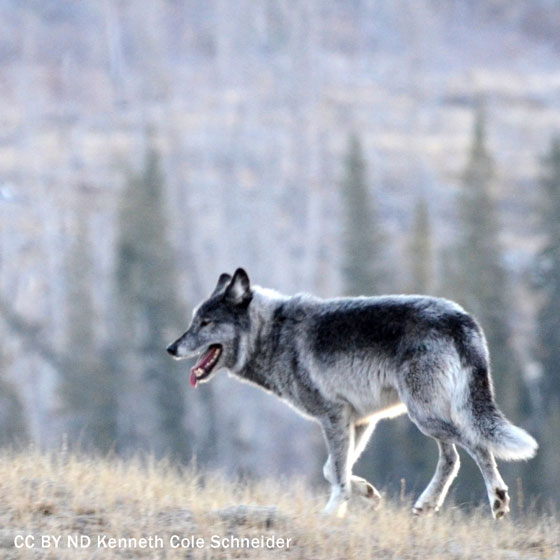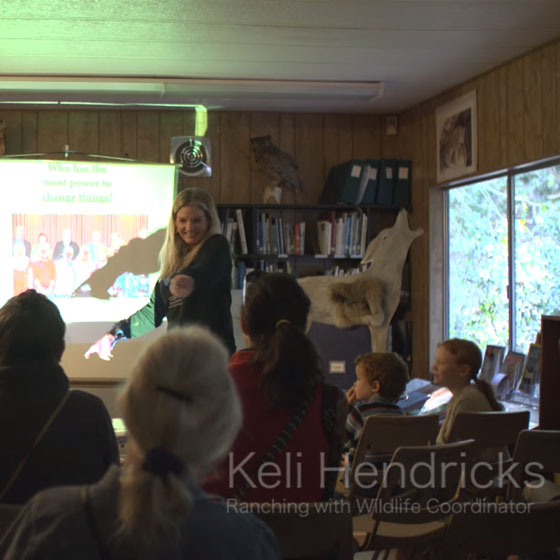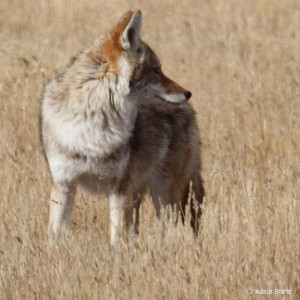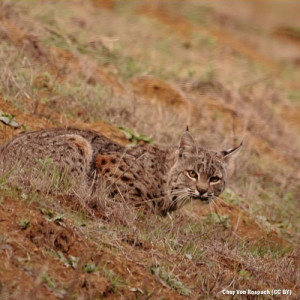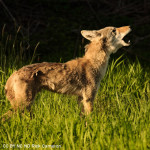MARCH 2016
We’re excited to offer a Ranching With Wildlife workshop in Petaluma, California later this month featuring experts who will discuss non-lethal methods to reduce conflicts between predators and livestock and who will discuss the benefits ranchers can expect when coyotes and other predators inhabit their land. Read more below about this and about our ongoing efforts to fundamentally change the way we look at and treat predators in North America.
For Compassionate Coexistence,
Camilla H. Fox
Founder & Executive Director
Reforming Predator Management
Since our founding, Project Coyote has been working to expose the notorious USDA “Wildlife Services” predator control program that kills more than 100,000 native carnivores each year (and since 2000 has killed at least 2 million native mammals) at a cost to taxpayers of more than a million dollars annually. Working with allies, we have sued to force this agency to comply with environmental laws that requires a full assessment of the impacts of the program on the environment and on non-target wildlife. We will soon share news about our lawsuit in Mendocino County on this front. Listen to Project Coyote Science Advisory Board member, Dr. Rick Hopkins and Ranching With Wildlife Coordinator, Keli Hendricks discuss predator management in this radio interview moderated by Advisory Board member and former Mendocino Planning Commissioner, Don Lipmanson here.
In the cover story of High Country News investigative reporter. Ben Golfarb delves into the disconnect between the agency’s research of non-lethal methods and its field operations along with its failure to implement nonlethal methods in the field. Project Coyote Representatives and Science Advisory Board members are interviewed, which you can read here. In a more scathing expose of the agency in the March edition of Harper’s magazine, reporter Chris Ketcham reveals an institutional pattern of high-level cover up and a culture of cruelty.
[wpi_designer_button id=’14946′]
Ranching With Wildlife
Project Coyote is excited to announce our upcoming workshop Ranching With Wildlife, Building Sustainable Communities, Preserving our Heritage on March 26th. Come learn about the Marin Livestock and Wildlife Protection Program and nonlethal solutions to reduce wildlife conflicts in agricultural areas. We will talk about livestock guardian animals and innovative techniques like Foxlights and other disruptive stimuli-based deterrents. Cosponsored with the Marin County Department of Agriculture and Fibershed, this workshop is free and open to the public. We are asking attendees to RSVP.
[wpi_designer_button id=14948]
Ending Wildlife Killing Contests
Through grassroots mobilizing, alliance building and media exposure, Project Coyote Arizona Representative, Linda Bolon has been working hard to stop wildlife killing contests in Arizona. She gathered thousands of signatures on an online petition exposing the 2016 Annual Coyote Calling Championships held in Holbrook last month and submitted the petition to Navajo County District III Supervisor, Jason Whiting and Governor Doug Ducey urging them to halt the contest. The kill fest, sponsored by rifle maker, Specialized Dynamics, awarded a $25 cash prize for “big dog” or “little dog” prey sizes, as well as trophy buckles and customized hunting rifles. While we were not able to stop the contest because state law allows it, Project Coyote and other wildlife conservation groups continue to press for legislative reform. Most people- including legislators- have no idea that wildlife killing contests are happening and that they’re legal. Our film about wildlife killing contests featuring Project Coyote Advisory Board member and actor, Peter Coyote is underway and we encourage supporters interested in screening the film in their community to contact us. We need help in exposing this barbarity and increasing public awareness about it. Read more below.
[wpi_designer_button id=’14950′]
Protecting Wolves in California
With your support, the California Fish and Game Commission listed wolves under the California Endangered Species Act (CESA) in 2014, providing wolves recolonizing their historic range in California with the extra protections needed for recovery (wolves in California are also still listed under the Federal Endangered Species Act though those protections are tenuous as the Fish and Wildlife Service debates delisting wolves from the ESA). While these regulatory mechanisms render both the intentional and accidental taking of gray wolves in California illegal, specific regulations are necessary to protect wolves in the state from one of the greatest threats to their recovery: the accidental killing of gray wolves mistaken for other species, particularly coyotes, in night-time hunting and lethal trapping currently permitted in occupied and potential wolf territory. Project Coyote and the Center for Biological Diversity have petitioned the California Fish and Game Commission to better protect wolves recolonizing California from night-hunting and lethal trapping. CA Residents: Our petition will be considered by the Commission at the upcoming Santa Rosa Commission meeting on Thursday, April 14 and we need your support! Stay tuned for our action alert on this issue.
Keeping It Wild
As part of our Keeping It Wild youth education program, Project Coyote Ranching with Wildlife Coordinator, Keli Hendricks helped spread our message of compassion and appreciation for wildlife to a group of young people, parents and educators in Napa, California in February. Our education program teaches students that they can make a difference. Students begin to understand broader issues including the interconnectedness of ecosystems, community and public health and the increasing scarcity of natural resources. We encourage and empower educators and youth to become active in their communities by advocating for wildlife and for compassionate coexistence. Watch Keli in action below and stay tuned for a longer piece being developed that will be available to educators. With thanks to Fauna Tomlinson for making this video possible and to Chase Becsey for his assistance in filming and video production.
[wpi_designer_button id=’14957′]
OTHER NEWS
Wildlife Services and its eternal war on predators
The federal agency has been researching nonlethal means to protect livestock for decades. So why is it still killing so many carnivores? Read More
The Rogue Agency
A USDA program that tortures dogs and kills endangered species by Christopher Ketcham. Read more
Conservation Group Protests Local ‘Coyote-Killing Contest’
A controversial hunting event scheduled this month in Holbrook has drawn the attention of a North American animal conservation organization… Read more
Join our E-TEAM
Get periodic e-news, action alerts, and join our growing network of educators, scientists, predator friendly ranchers and citizen leaders who are helping people and wildlife coexist in our communities.
Join a growing community of educated and empowered citizens by expressing your commitment to compassionate conservation with a financial investment.
You can DONATE, become a SPONSOR or leave a LEGACY GIFT.


